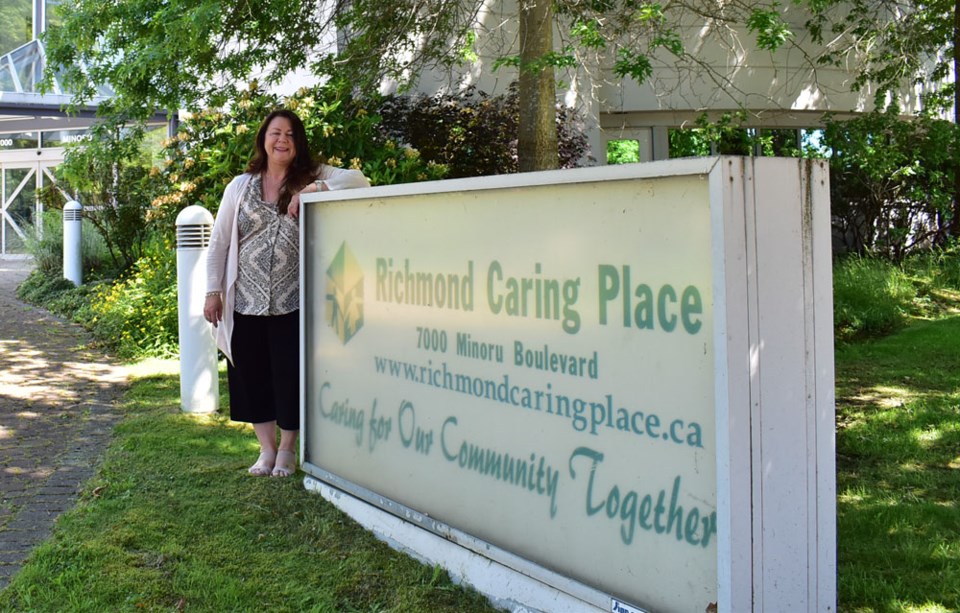Richmond city council has increased how much affordable housing developers have to build in City Centre, but one non-profit claims it has struggled to get buy-in at city hall to build low-rental apartments.
The Caring Place Society has a vision to build affordable housing — including some $375/month shelter-rate rentals — on the city-owned land where they currently operate, but they say they’re still waiting for a commitment from the city to back them up.
And this municipal commitment is what senior levels of government are looking for before financing these types of projects, explained Tiffany Duzita, executive director of the Community Land Trust, a non-profit that holds land in trust and develops non-profit housing on it, largely in Vancouver.
Last week, city council raised its requirement for affordable homes in large-scale developments — 60 units and bigger — in City Centre from 10 per cent to 15 per cent.
A consultant, GP Rollo, who analyzed the proposal to raise the affordable-rental requirement, concluded 20 per cent would have caused too much risk to developers, so city council stuck with the recommended 15 per cent.
The Caring Place Society, which operates a building on Granville Avenue at Minoru Boulevard that rents to local non-profit societies, has been working on their proposal for years to double its non-profit space and build two residential towers on the same lot.
Belinda Boyd, chair of the Caring Place Society board of directors, said she’d like to see the city and the society on the same page with the project given one of the city’s affordable housing strategies is to build on city-owned land.
“It ticks a lot of boxes, and it really is a win-win-win,” Boyd said.
In fact, being located on city-owned land means they can’t leverage the property to finance any project.
When Boyd and other board representatives met with city staff this summer, she said the reception was lukewarm.
The city told the News they were presented with a “high level concept,” but because no development permit has been submitted, they couldn’t comment on it.
The message Boyd said she walked away with was that they should seek funding from higher levels of government.
But Duzita said the city needs to back them first, before the society can seek other funding.
Funding non-profit housing can be “tricky,” she said, with provincial and federal governments looking for municipal commitments for projects and often requiring a lot of design work, and sometimes building permits, before they give money for any projects.
“That’s a significant amount of money that the non-profit has to invest — millions to get to that point — and you don’t have certainty with funding programs till you get to that point,” Duzita said.
The Caring Place project is estimated to cost $144 million, but, technically, the non-profit isn’t asking for money from the city, operational or otherwise.
Rather, they want the city to redirect affordable housing that will be required at CF Richmond Centre and Lansdowne Shopping Centre, both being redeveloped, to the Caring Place site instead.
However, Duzita questions why affordable housing can’t be built both at the Caring Place site as well as at the two shopping centres.
In the past 14 years, 926 new affordable units have been built in Richmond, including the Storeys building, which is on city-leased land and to which the city gave $19.7 million, and Kiwanis seniors home.
Council puts off market rental decision
According to CMHC, the rental vacancy rate in Richmond is 1.7 per cent (October 2020 figures) while only 925 new purpose-built market rentals have been built in the city since 2007.
City council, however, delayed pushing through a recommendation from city staff to require 10 per cent market rental in all new large-scale developments throughout the city. This will come back to council later with options to have some flexibility on the percentage.
Coun. Chak Au told the News he’d like to see a range, for example, five per cent for smaller projects and up to 15 per cent for larger ones.
Au said he made the motion to ask for this flexibility in order to get the policy right, instead of pushing it through too fast, but, he added, his intent wasn’t to delay getting more market rentals.
About 26 per cent of Richmond residents are renters and, with average home prices at $718,000 for a condo, $924,000 for a townhouse and $1.9 million for a single-family house, buying a home remains out of reach for many residents.
Almost 850 new homes came on line in Richmond in the first six months of 2021 alone and construction began on well over a thousand new homes.
While some of these new homes might eventually turn into market rentals, that is not guaranteed.
In fact, no new purpose-built market rentals were created in the first half of 2021 in Richmond.
John Roston, coordinator of the Richmond Rental Advocacy Group, called the city’s claim — in a report that went to council — that 190 market rentals would meet demand “ridiculous.”
He pointed out the same city staff report noted 30,000 commuters come into Richmond to work every day, which taxes both the transportation system and the environment.


